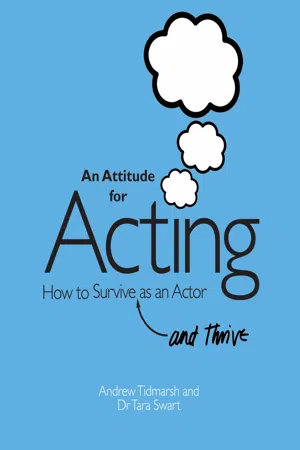1 A Useful Attitude
There is nothing
either good or bad,
but thinking makes it
so.
Hamlet, Act II Scene ii
As an actor, feelings of powerlessness are an easy option. You often have the impression that you have no control over the path you are taking. Your success and happiness are being prevented by people you do not know and have no way of meeting: agents, casting directors, producers and directors. You are stuck in a cycle of aspiration and disappointment, and each day ends with a dissatisfied feeling of ‘if only’.
Let us introduce Lucy. Lucy was thrilled when shortly before her eighteenth birthday she won a place at one of the country’s top drama schools. That was five years ago. Lucy enjoyed the first two years of her course. Guest speakers often came in to tell her and her fellow students how hard it was being a professional actor, but Lucy thought that she would be all right. Other people would find it hard: those who are not as talented, or who do not want it as badly. Then, in the final year, she felt that she was not getting the parts in the productions that she deserved. She watched some of her classmates being snapped up by top agents while she was left going for meetings with mediocre agents who did not really excite her. But Lucy signed up with an agent, and, when she first left drama school, she went up for many auditions, but these have slowly decreased in number. Lucy has the feeling that as younger actors have joined the agency, they are now being given the chances that she once had, and her career is being neglected by her agent. Lucy has done some work in the three years since leaving drama school: a national tour of a Jane Austen adaptation, an episode of Doctors and a small part in an independent British film. Meanwhile, one of Lucy’s classmates is nearly ‘A-list’. There are articles about her in gossip columns and photographs of her appear in tabloid newspapers. This classmate has been in a prime-time BBC drama and made two feature films with a major Hollywood film studio. She even occasionally pops up on chat shows. There seems to be ‘one’ in every year at each reputable drama school: an actor who leaves and goes on to instant film and television success. This seems so unfair.
Lucy feels trapped and unhappy. She recently did a play in a theatre above a pub in North London. She felt that the work was good, but few people came to see it; not even her agent. Lucy got on well with the cast members but few of them had done any paid work at all, and so she felt that they were all a little ‘beneath’ her in terms of what ‘league’ they were in. She made a decision that she would never do fringe theatre again, as she felt that doing a ‘profit-share’ meant that she was making a financial investment herself, as she had to miss work for rehearsals, but still pay her rent and bills. There was clearly not going to be much profit from the profit-share.
Lucy is lucky as she has paid work in a local café. They are flexible with her shifts, so she can get time off for auditions when they occur. She also knows the regular clientele, and so has a sense of belonging, although she gets embarrassed when they ask about her acting career, as she does not seem to have done much lately. Once a week, Lucy helps in a local young persons’ drama group. The participants range from eleven to fifteen years old, and they are usually full of enthusiasm. Initially Lucy enjoyed helping out, but now she is feeling tired; tired of keeping other people’s dreams alive when hers are fading. In fact, Lucy is thinking about herself less as an actor, and more as a waitress and part-time teacher. When an audition comes along, Lucy feels so nervous and desperate that she does not enjoy the meeting and is convinced that she does not show herself off at her best. She is beginning to lose her confidence and wonder if she is ever going to act again. Lucy is starting to think that she will give it another twelve months, after which she will put an end to this misery. She has considered training to become a primary-school teacher.
There may be elements of Lucy’s story that you recognise:
The feelings of hope and enthusiasm you once had when you were younger disappearing.
A sense of inevitable disappointment accompanying you most of the day.
Looking at successful actors with envy, and questioning why it is them and not you.
Feeling frustrated that you do not have the access to the ‘gatekeepers’ of the industry that others seem to.
Feeling that you are spending lots of time thinking about acting, but little time actually doing it.
The sense that you are not really an actor any more, but that you define yourself by your part-time job instead.
A feeling of anger and bitterness that you are not doing what you want and that you are wasting your life.
Margaret is another actor whose story we will be taking a look at throughout this book. Margaret is at a different stage in her career from Lucy. She once had what she considered to be a successful career. She performed good roles in theatres around the country, and regularly got parts in television dramas. She had performed in all the plays that any actor would hope to do: Shakespeare, Tenn...







